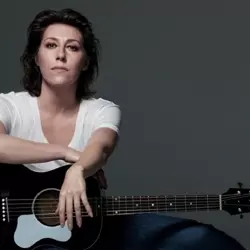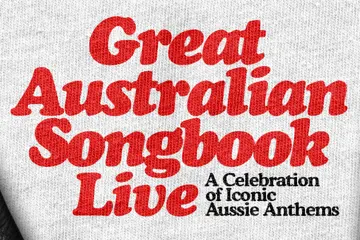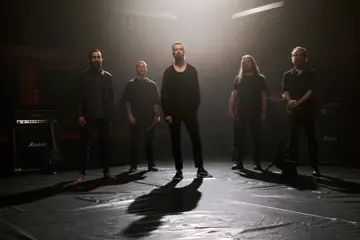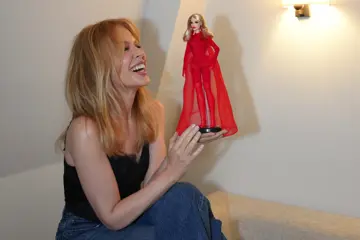 Martha Wainwright
Martha WainwrightWith Come Home To Mama, Martha Wainwright again proves her place as a soulful, sensitive, layered and funny songwriter. Her two previous solo efforts, Martha Wainwright (2005), I Know You're Married But I Have Feelings Too (2008), and Sans Fusils, Ni Souliers, à Paris: Martha Wainwright's Piaf Record (2009) each gave her a chance to explore her place in relation to established systems, and this new one does too, but with a new focus. “A lot of the songs are about my mum [Kate McGarrigle] dying and marriage and the difficulty of relationships and wanting to continue on, but I also wanted to acknowledge the other big occurrence in my life, which was becoming a mother and having a child,” she explains. “And it needs to be accompanied by humour, especially if you're commenting on marriage or things that are uncomfortable or difficult, it needs a dose of 'not taking yourself too seriously'.”
Using a song cycle to visit the cycle of life, as it were, is hardly new, but Wainwright's musical position this time is a clear development. No longer the littlest in the group but now a leader, here, for example, she attacks motherhood from a place of sweet apology rather than necessary joy or celebration – it's funny, kind and inviting. The song in question, called Everything Wrong, is a tribute to her little boy Arcangelo, and wasn't quite an afterthought for the album, but certainly something that came up unexpectedly. “That song, I wrote very quickly and the record was almost done when I wrote it,” Wainwright explains, “and to be honest it just flowed out of me. I was having a sad, tough day, and you know, I picked up a guitar and sometimes these things are just connected to some interior voice, and that's when those become good days, that's when songs can be easy to write, when they just sort of come out, and you let it tell its own story.”
In the song Wainwright sings to Arc directly about what they can do together as he grows (with a sweet simplicity that sounds like what John Lennon might have channelled while writing for Sean in Beautiful Boy). But there's also a clarity that comes with being a contemporary parent. Hilarious, honest and heartfelt, she explains, laughing, “I also wanted to acknowledge the other big occurrence in my life, which was becoming a mother and having a child and the most honest way that I could that in that moment was to apologise in advance for all the damage I will cause him.”
Wainwright's approach to music is one that has been informed by failure as well as success, and her output is characterised by a willingness to share the good, the bad and the ugly. As she explained, “I've had moments of high drama in my life which I draw on, but it's not always like that. And there's also sometimes things that come out of my mouth which can come across as a bit aggressive or subversive or shocking but, you know, to some writers that might be a bit dangerous. But my instinct is to keep it and go with it because it's more interesting and a stronger and more potent, potentially, comment. So I like that, and I allow myself to be that way and to open my mind to those kinds of perhaps raw inner thoughts, or something like that.”
Don't miss a beat with our FREE daily newsletter
Beyond the personal and raw is influence of her family, which this time saw itself lyrically as she explored the process of losing her musician mother Kate McGarrigle. Beyond her own compositions Wainwright also sang some of McGarrigle's music, the song Proserpina, which was McGarrigle's last composition. McGarrigle got to perform live at the Royal Albert Hall, but never recorded it. On Come To Home Mama (which is a lyric from Proserpina), Wainwright presents something that is part tribute, part cover, part new entity. It's a re-interpretation of the famous folk singer's final piece that is both a personal and professional passing on of the torch.
“That's an interesting way of putting it [as a re-interpretation] – no one's ever put it like that, but in a way it probably is. She never got to record it so I don't know what her real intention was for it, so in that sense I have taken some liberties, but it's pretty close to the one time that she performed it. And that's connected to this Greek idea of the Greek choir and response, which was all her thought process [in the lyrical target and musical approach to the song]. The reason that I wanted to record it is that I wanted to feel closer to her and I wanted to become her in a way, I sound a little bit like her when I sing it, and I wanted to use the way to become a bit more like her and perhaps to absorb her final thoughts into me as a transference or whatever. So I would like to think that she's singing, in a way.”
On her upcoming Australian tour, Wainwright will perform her album at various theatres, including the Opera House, a room she's played in both on her own in the past and as part of mega tributes like the Leonard Cohen I'm Your Man series a few years back. Hardly a stranger to pomp and its importance, she happily talks about it being as being a special place from onstage, as well as for us sitting in that 1970s-decorated splendidness in the audience. “The Opera House is iconic worldwide, so that's exciting. And it's the kind of thing that if you tell people you're going to play the Opera House it's like playing Carnegie Hall, it's world-renowned. Also for me it's a very big deal, and probably I would say the height of my career when I played it last time with the Piaf thing [her live tour of her Piaf record]. I sold it out, or close to I think, and that was a really big deal for me. It wipes away some of those tougher days as an artist when you think, 'Is anyone listening? Why am I doing this? Am I any good? Should I quit?' – those kinds of things can run through your mind, when you can do the Opera House and be accepted in that room then it makes it all worth it.” Wainwright also keeps warm memories of fans from the Opera House last time around, some of whom left her a few little bits for her little one, too. “Yes, some fans were great and there were a lot of little koalas to tack onto the top of his pencils and things like that, which I remember getting too because my mum went to Australia when I think I was about 7 or 8,” she says, sweetly.















